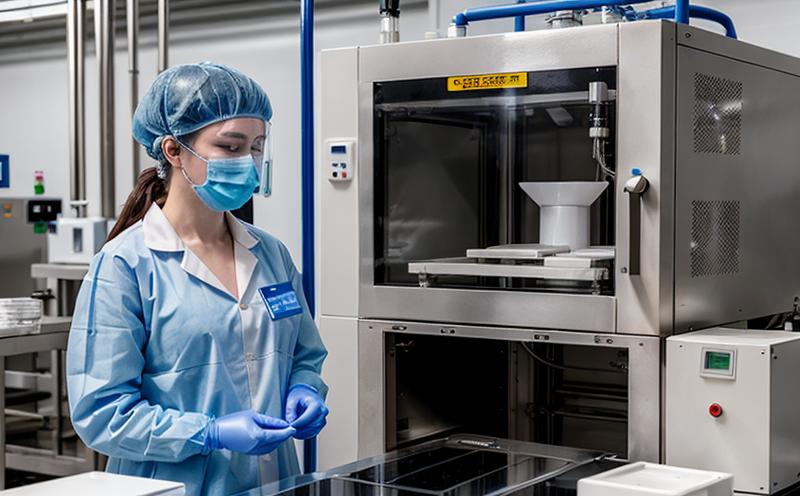GMP Complaint Handling Compliance Testing
In the pharmaceutical industry, Good Manufacturing Practice (GMP) is a globally recognized system intended to ensure that products are consistently produced and controlled according to quality standards. GMP complaint handling compliance testing plays an integral role in ensuring that pharmaceutical companies maintain these stringent standards throughout their manufacturing processes.
When a customer or regulatory body raises a complaint about the quality, efficacy, or safety of a product, it is critical for manufacturers to respond promptly and thoroughly. This response must encompass investigation into the nature of the complaint, corrective actions taken, and documentation of all steps involved in resolving the issue. Failure to adhere to GMP standards can lead to significant consequences including fines, product recalls, and even legal action.
GMP compliance testing for complaint handling involves a series of rigorous tests designed to identify potential issues that could have caused dissatisfaction with the product. These tests are conducted using advanced analytical instruments and methodologies aligned with international standards such as ISO 17025 and ICH Q7A. The aim is not only to resolve current complaints but also to prevent similar issues from occurring in future batches.
One of the key aspects of GMP complaint handling compliance testing is understanding the specific nature of the complaint. This could range from packaging integrity concerns, to variations in active ingredient content, or even discrepancies in labeling information. Once identified, each issue must be addressed through a structured approach involving root cause analysis, implementation of corrective measures, and verification of effectiveness.
Testing methods used during this process include spectroscopy for detecting impurities, chromatography for analyzing component purity, and microscopy for examining physical properties like particle size distribution. Additionally, microbiological testing ensures that no contaminants are present in the final product. All results obtained from these tests are meticulously documented and reviewed by quality assurance teams before being reported back to stakeholders.
The importance of accurate documentation cannot be overstated. Proper record keeping allows organizations to demonstrate adherence to regulatory requirements while simultaneously providing evidence of effective problem-solving strategies employed during complaint resolution. Regular audits conducted by internal auditors or third-party inspection bodies help ensure ongoing compliance with GMP guidelines.
Why It Matters
GMP complaint handling compliance testing is crucial for maintaining consumer trust and ensuring public safety. By addressing complaints systematically and scientifically, pharmaceutical companies can mitigate risks associated with non-compliance issues. This proactive approach helps build brand reputation and fosters long-term relationships with customers.
In today’s highly competitive market environment, brands that prioritize quality over cost are more likely to succeed. GMP compliant practices not only enhance operational efficiency but also contribute positively towards sustainability goals by reducing waste generation and optimizing resource utilization.
Moreover, compliance with GMP standards is mandatory for many countries around the world. Regulatory authorities like the US Food & Drug Administration (FDA), European Medicines Agency (EMA), and World Health Organization (WHO) enforce strict regulations governing pharmaceutical manufacturing processes. Non-conformity can result in severe penalties including suspension of production licenses or even criminal charges against responsible parties.
From an ethical standpoint, GMP complaint handling compliance testing represents a commitment to patient well-being. It ensures that only safe and effective medicines reach the market, thereby protecting public health interests. By investing time and resources into robust complaint management systems, manufacturers contribute significantly towards achieving global health objectives outlined by international organizations.
Benefits
The benefits of implementing GMP complaint handling compliance testing extend beyond mere regulatory adherence; they offer tangible advantages that impact various stakeholders within an organization. For instance, improved product quality reduces the likelihood of adverse reactions among consumers, leading to enhanced customer satisfaction levels.
| Benefit | Description |
|---|---|
| Enhanced Reputation | A reputation built on consistent GMP compliance strengthens brand loyalty and fosters trust with both existing customers and potential new ones. |
| Operational Efficiency | Streamlined processes reduce downtime, lower operational costs, and improve overall productivity rates. |
| Risk Mitigation | Prompt resolution of complaints minimizes the risk of costly recalls or legal disputes while safeguarding against reputational damage. |
| Sustained Compliance | Regular audits ensure continuous adherence to evolving regulatory expectations, thereby maintaining a compliant status over extended periods. |
| Patient Safety | GMP compliance testing focuses on identifying and eliminating hazards early in the development lifecycle, promoting safer products for all users. |
In addition to these direct benefits, effective GMP complaint handling practices contribute significantly towards achieving broader organizational objectives such as sustainable growth, improved financial performance, and enhanced employee morale.
Use Cases and Application Examples
GMP complaint handling compliance testing finds application across diverse scenarios within the pharmaceutical sector. Here are some illustrative examples:
| Scenario | Description |
|---|---|
| Customer Complaint About Color Variability | A client reports that tablets produced at different times have varying colors despite using identical raw materials. To investigate this issue, spectroscopic analysis is performed to check for consistent coloration across all batches. |
| Laboratory Error in Labeling Information | An error was made during labeling which incorrectly stated the expiration date of a particular batch. Upon discovering this mistake, immediate corrective action was taken by reprinting labels and relabeling affected containers. |
| Customer Concern About Particle Size Distribution | A patient experienced difficulty swallowing capsules due to their large size. Microscopy studies revealed that some particles were indeed larger than specified limits. Adjustments were made to the manufacturing process to ensure uniformity. |
| Regulatory Body Inspection Findings | During a routine inspection, discrepancies in active ingredient content levels were noted. Extensive testing was carried out using HPLC to pinpoint exact deviations and rectify them promptly. |
These examples underscore the versatility of GMP complaint handling compliance testing across various stages of drug development and production lifecycle.





